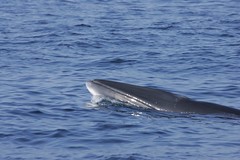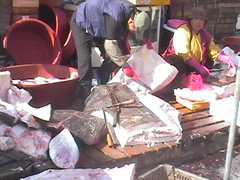 據南韓政府高級官員表示,該國已放棄日前宣布要獵捕鯨魚做科學研究的計畫。
據南韓政府高級官員表示,該國已放棄日前宣布要獵捕鯨魚做科學研究的計畫。
在7月初的國際捕鯨委員會(International Whaling Commission)年會上,南韓所提出的計畫遭到眾多重視鯨豚保育國家如紐西蘭和澳大利亞的反對。
12日,在柬埔寨首都金邊舉行之東亞高峰會(East Asia Summit)上,南韓外交部長金星煥(Kim Sung-hwan)與澳洲外交部長Bob Carr的會談中傳出了南韓將改變政策的消息。
Kim對澳洲外長表示,南韓將聽從國際捕鯨委員會的建議,終止南韓在朝鮮半島水域的「科研捕鯨」計畫。
7月6日,澳洲大使Sam Gerovich於首爾對總統李明博辦公室轉達了該國強烈反對南韓恢復捕鯨的意見。
7月17日,南韓聯合通訊社(South Korea's Yonhap News Service)引用一名不願透露姓名之高級政府官員的說法,「政府各部會間的討論已得到結論,將放棄在沿海水域捕鯨的計劃。」
國際捕鯨委員會自1986年以來,禁止商業捕鯨行為,企圖讓鯨豚的數量得以回升,許多物種在經過一個世紀的獵捕後,已瀕臨滅絕。
目前,只有日本擁有特別許可證,得以進行可奪取鯨豚性命之「科研」捕鯨。這項行為雖然合乎國際捕鯨公約之條款,但許多國際捕鯨委員會成員國政府仍表示反對。
在這個月的國際捕鯨委員會會議上,南韓代表姜俊錫(Kang Joon-Suk)告訴其他代表,南韓「科研」捕鯨計劃的原因,是為了「正確地了解南韓水域約35種鯨豚的攝食偏好」,以及「鯨豚族群量對漁業資源的影響」。
姜俊錫表示,在70與80年代至捕鯨禁令生效期間,朝鮮半島周圍海域每年約抓獲1000頭小鬚鯨。然而,為了遵守國際捕鯨委員會之決定,長久以來為生計與營養用途之沿海捕鯨傳統於1986年停止。
 姜俊錫指出,一直以來,南韓蔚山的漁民們都在捕鯨,而現在則受到要求要有限量的捕鯨,「鯨豚干擾漁民捕魚活動的情況越來越頻繁,以及應屬於人類的大量魚獲被數量越來越多的小鬚鯨吃掉。」
姜俊錫指出,一直以來,南韓蔚山的漁民們都在捕鯨,而現在則受到要求要有限量的捕鯨,「鯨豚干擾漁民捕魚活動的情況越來越頻繁,以及應屬於人類的大量魚獲被數量越來越多的小鬚鯨吃掉。」
根據政府的估計,南韓海域的鯨豚每年約吃掉12%漁獲量,約146,000噸。
但是,南韓擬科研獵捕的小鬚鯨屬於鬚鯨,只吃小型的浮游生物、磷蝦和非常小的魚。
韓國漁民所捕撈的鯨豚,主要是被捕撈其他物種的漁網糾纏,而造成混獲(by-catch)。
每年皆在南冰洋鯨豚禁捕區(Southern Ocean Whale Sanctuary)與日本捕鯨船奮戰的鯨豚保育團體海洋守護者協會(Sea Shepherd Conservation Society)表示,全世界混獲的鯨豚數量超過魚網意外捕撈到的數量。
南韓政府最近通過了一個新的法規以保育和管理鯨豚資源,建立透明的制度來分配因擱淺或混獲而產生的鯨魚肉。因此,即使「科研」捕鯨計畫已終止,想吃鯨魚肉南韓民眾仍可以吃到鯨魚肉。
South Korea has abandoned its recently announced plan to hunt whales for scientific research, according to senior government officials.
First mentioned at the International Whaling Commission annual meeting earlier this month, the Korean plan raised objections from many whale conservationist countries such as New Zealand and Australia.
The first indication of Korea's change in policy came Thursday during a meeting between Korean Foreign Minister Kim Sung-hwan and Australian Foreign Minister Bob Carr at the East Asia Summit in Phnom Penh, Cambodia.
Minister Kim told Senator Carr that Korea would take the advice of the International Whaling Commission on the subject, indicating that plans for "scientific whaling" in immediate waters surrounding the Korean peninsula would not proceed.
Australia's Ambassador in Seoul, Sam Gerovich, had conveyed Australia's strong opposition to a resumption of whaling in talks with the Office of President Lee Myung-bak on July 6.
Today, South Korea's Yonhap News Service quoted a senior official who spoke on condition of anonymity as saying, "Discussions between government ministries have been concluded in a way that effectively scraps the plan to allow whaling in coastal waters."
The IWC has had a moratorium on commercial whaling in place since 1986 in an attempt to allow whales to recover after centuries of whaling drove many species close to extinction.
At present, only Japan carries out special permit lethal "research" whaling. This is permitted under a clause in the IWC Convention, although many IWC member governments have expressed opposition to the practice.
At this month's IWC meeting, head of the South Korean delegation, Dr. Joon-Suk Kang, told the delegates the reason for his country's "research" whaling plan was to "correctly identify the feeding habits" of about 35 species of whales in Korean waters and thus "the impact of the whale population on the fisheries resources."
In the 1970s and 1980s up to the moratorium, said Dr. Kang, about 1,000 minke whales were captured annually around the Korean peninsula. "However, the long coastal whaling tradition for livelihood and nutritional purposes was suspended in 1986 in compliance with the IWC decision," he said.
Fishermen in Ulsan, South Korea, who traditionally have been whalers, have been calling for limited whaling, said Dr. Kang.
"This is because they are experiencing disturbances in their fishing activities due to frequent occurrences of cetaceans in their fishing grounds and an increasing number of minke whales are eating away large amount of fish stocks which should be consumed by human being," he said.
The whales in South Korean waters are believed to be eating some 146,000 tons of fish annually, about 12 percent of the country's annual fisheries production, according to government estimates.
But the minke whales targeted for Korean research whaling are baleen whales that eat only small plankton, krill, and very small fish.
Korean fishermen have been harvesting whales entangled in their fishing nets as "by-catch" while they were fishing for other species.
The number of whales harvested as by-catch exceeds the number of whales accidentally caught in fishing nets anywhere in the rest of the world, according to the Sea Shepherd Conservation Society, a whale defense organization that battles the Japanese whaling fleet in the Southern Ocean Whale Sanctuary each year.
South Koreans who want to eat whale meat will still be able to do so even though the "research" whaling plan has been abandoned. The Lee Government has recently adopted a new ministerial Directive on the Conservation and Management of Whale Resources to establish a transparent system of distribution for stranded or by-caught whale meats.




